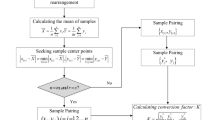Abstract
Condition monitoring plays an important role with regard to forecasting structural failure of shafts in Advanced Manufacturing Systems (AMS). Repairs affect the downtime of machines considerably due to scheduled maintenance. The waste product of scheduled maintenance are parts that are treated as exhausted components for disposal. The disposed parts contain Residual Useful Life (RUL). Operational costs due to scheduled maintenance can be reduced through Condition Monitoring (CM) parameters that are utilized in Predictive Maintenance (PdM). The study utilizes logistic regression Machine Learning (ML) algorithm to predicting specific classification markers as a relevant step to monitor the health of a bright-steel shaft under various bending loading. Various loading conditions were monitored and compared, employing Principal Component Analysis (PCA). Predictions were tested by utilizing K-Means and DBSCAN clustering techniques. The Logistic Regression (LR) machine learning algorithm was employed to determine the prediction accuracy under various loads. A shaft was rotated under various bending loads which followed the experimental methodology of the R.R. Moore fatigue test. The goal of the experiment was to determine the prediction accuracy under various loads. Prediction scores for K-means clustering showed a overall decrease in accuracy in the increase of cluster numbers and the prediction accuracy showed increases and decreases for DBSCAN clustering with the increase of loading for various cluster selection.
Access this chapter
Tax calculation will be finalised at checkout
Purchases are for personal use only
Similar content being viewed by others
References
Lees, A.W., Friswell, M.I.: Where next for condition monitoring of rotating machinery? Adv. Vibration Eng. 5(4), 263–277 (2006)
Guo, D., Shi, X., Wang, Y., Sun, G.: Effect of shaft manufacturing bending deviation on dynamic response of geared rotor system. Adv. Mech. Eng. 8(10), 1–13 (2016)
Dong, Y., **a, T., **ao, L., **, L.: Real-time prognostic and dynamic maintenance window scheme for reconfigurable manufacturing systems. In: ASME 14th International Manufacturing Science and Engineering Conference, Fairfield (2019)
Ye, X.W., Su, Y.H., Han, J.P.: A state-of-the-art review on fatigue life assessment of steel bridges. Math. Problems Eng., 2014(Special Issue), 1–13
Lin, T.R., Tan, A.C.C., Howard, I., Pan, J., Crosby, P., Mathew, J.: Development of a diagnostic tool for condition monitoring of rotating machinery. In: Proceedings of ICOMS Asset Management Conference, Gold Coast (2011)
Li, Z.: Industry 4.0 - Potentials for Predictive Maintenance. In: 6th International Workshop of Advanced Manufacturing and Automation, Manchester (2016)
Moya, M.C.C.: The control of the setting up of a predictive maintenance programme using a system of indicators. Omega 32(1), 57–75 (2003)
Koons-Stapf, A.: Condition Based Maintenance: Theory, Methodology, & Application, Reliability and Maintainability Symposium, Tarpon Springs (2015)
Leone, G.: An algorithm for data-driven prognostics based on statistical analysis of condition monitoring data on a fleet level. In: IEEE International Instrumentation and Measurement Technology Conference, Pisa (2015)
Sepahpour, B.: A Practical Educational Fatigue Testing Machine. In: 121st ASEE Annual Conference and Exposition, Indianapolis (2014)
Nogueira, R.M., Meggiolaro, M.A., Castro, J.T.P.: A Fast-Rotating Bending Fatigue Test Machine. In: 24th ABCM International Congress of Mechanical Engineering, Curitiba (2017)
Jiří, K., Kuca, K., Blazek P., Krejcar O.: Application of Artificial Neural Networks in Condition Based Predictive Maintenance, Recent. In: Developments in Intelligent Information and Database Systems, Cham, Springer International Publishing, pp. 75–86 (2016)
Saxena, A., Saad, A.: Evolving an artificial neural network classifier for condition monitoring of rotating mechanical systems. Appl. Soft Comput. 7(1), 441–454 (2007)
Wang, K., Li, Z., Braaten, J., Yu, Q.: Interpretation and compensation of backlash error data in machine centers for intelligent predictive maintenance using ANNs. Adv. Manuf. 3(2), 97–104 (2015)
Plante, T., Stanley, L., Nejapak, A., Yang, C.X.: Rotating machine fault detection using principal component analysis of vibration signal. Anaheim, IEEE AUTOTESTCON (2016)
Ding, C., He, X.: K-means clustering via principal component analysis. In: ICML ‘04: Proceedings of the twenty-first international conference on Machine learning, New York (2004)
Arebi, L., Gu, F., Ball, A.: A comparative study of misalignment detection using a novel Wireless Sensor with conventional Wired Sensors, 25th International Congress on Condition Monitoring and Diagnostic Engineering (COMADEM 2012), Huddersfield (2012)
Saxena, M., Bannett, O.O.: Bearing fault evaluation for structural health monitoring, fault detection, failure prevention and prognosis. In: 12th International Conference on Vibration Problems, ICOVP, Guwahati (2015)
Chris D., He, X.: Cluster structure of K-means Clustering via Principal Component Analysis: Advances in Knowledge Discovery and Data Mining, pp. 414–418. Berlin, Springer (2004)
Hsu, J., Wang, Y., Lin, K., Chen, M., Hsu, J.H.: Wind turbine fault diagnosis and predictive maintenance through statistical process control and machine learning. IEEE Access 8, 23427–23439 (2020)
Author information
Authors and Affiliations
Corresponding author
Editor information
Editors and Affiliations
Rights and permissions
Copyright information
© 2023 The Author(s), under exclusive license to Springer Nature Switzerland AG
About this paper
Cite this paper
Basson, C.I., Bright, G., Padayachee, J., Adali, S. (2023). Investigation of Predictive Maintenance Algorithms for Rotating Shafts Under Various Bending Loads. In: von Leipzig, K., Sacks, N., Mc Clelland, M. (eds) Smart, Sustainable Manufacturing in an Ever-Changing World. Lecture Notes in Production Engineering. Springer, Cham. https://doi.org/10.1007/978-3-031-15602-1_36
Download citation
DOI: https://doi.org/10.1007/978-3-031-15602-1_36
Published:
Publisher Name: Springer, Cham
Print ISBN: 978-3-031-15601-4
Online ISBN: 978-3-031-15602-1
eBook Packages: EngineeringEngineering (R0)




